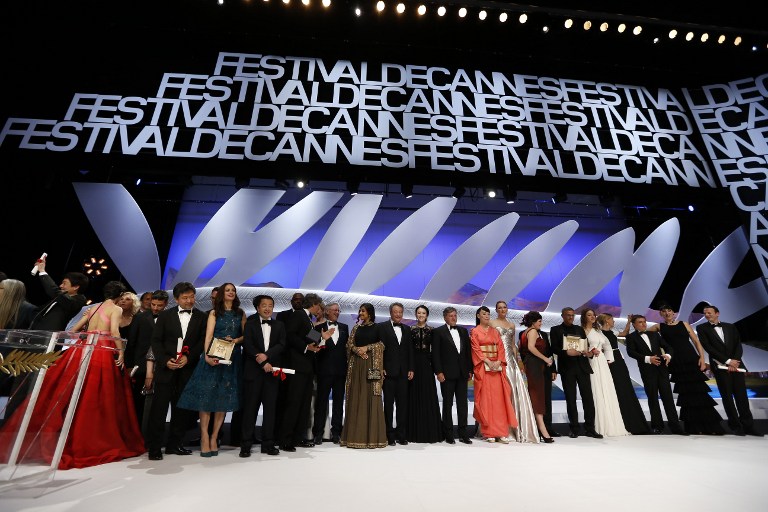SUMMARY
This is AI generated summarization, which may have errors. For context, always refer to the full article.

CANNES, France – An audacious lesbian love story featuring hardcore sex, “Blue is the Warmest Colour” by French-Tunisian director Abdellatif Kechiche, won the top prize Sunday, May 26, at the Cannes Film Festival in a watershed year for gay rights.
An all-star jury at cinema’s top showcase led this year by Hollywood director Steven Spielberg crowned the graphically erotic coming-of-age story set in France and clocking in at an epic three hours.
In an unusual step, Spielberg awarded the prize to Kechiche as well as the film’s two stars, Adele Exarchopoulos and Lea Seydoux, who joined him on stage to cheers and calls of “bravo” from the ceremony’s audience.
“I should like to dedicate this film to the wonderful youth of France whom I met during the long period while making this film,” said Kechiche.
“Those young people taught me a lot about the spirit of freedom and living together.”
The Tunis-born Kechiche, 52, also hailed the spirit of the Arab Spring as he claimed his gong in what critics called a strong year at the festival.
“I would also like to dedicate this film to other youth, something which happened not so very long ago, the revolution in Tunisia,” he said.
“They also have this aspiration to live free, to express themselves freely and to love in full freedom.”
Spielberg said choice of the international jury including fellow Oscar winners Ang Lee, Nicole Kidman and Christoph Waltz had been unanimous.
“For me, the film is a great love story and the fact that it is a great love story made all of us feel like we were privileged, not embarrassed, to be flies on the wall but privileged to have been invited to see this story of deep love and deep heartbreak evolve from the beginning, in a wonderful way where time stood still,” he told reporters.
“We were absolutely spellbound by the brilliance of the performances of those amazing young actresses and all the cast, and especially by the way the director observed his players, the way he just let the characters breathe. We just all found it was a profound love story,” he added.
“We were just happy that someone had the courage to tell the story the way they told it,” he said.
Top prize winners
The runner-up award, the Grand Prix, went to Joel and Ethan Coen’s “Inside Llewyn Davis” starring Carey Mulligan, Justin Timberlake and newcomer Oscar Isaac in the title role, which delighted audiences with a mix of soulful 1960s folk singing and absurdist humor.
The Coens’ film “Barton Fink” won Cannes in 1991 and the brothers last entered the running in 2007 with “No Country for Old Men”.
Mexico’s Amat Escalante claimed best director for the ultra-violent “Heli” about his country’s blood-drenched drug wars.
The 34-year-old filmmaker showed a family trapped in a vicious circle of crime and revenge, with torture scenes that left some queasy viewers running for the exits.
French actress Berenice Bejo clinched best actress honors as a harried Parisian mother in Iranian Oscar winner Asghar Farhadi’s patchwork family drama “The Past”.
Bejo, 36, made her name in the hit French silent movie “The Artist”.
One of the stars of Hollywood’s 1970s golden age, 76-year-old Bruce Dern, took the best actor prize for his performance as an alcoholic father in Alexander Payne’s recession-era road movie “Nebraska”.
China’s Jia Zhangke won the best screenplay award for “A Touch of Sin”, which offered a shocking look at rampant corruption in his country and exploitation of downtrodden citizens, who can only respond with violent rage.
And an emotional Japanese family drama about young boys switched at birth, Hirokazu Koreeda’s “Like Father, Like Son”, bagged the third-place jury prize.
Adapted from a graphic novel of the same name, “Blue” emerged as a favorite for the Golden Palm immediately after its premiere.
It traces lead character Adele’s infatuation with a beautiful blue-haired art student played by Seydoux, while also exploring themes such as class in France and women’s careers.
“Sure to raise eyebrows with its show-stopping scenes of non-simulated female copulation, the film is actually much more than that: it’s a passionate, poignantly handled love story,” a Hollywood Reporter critic said.
“You realize the film has won your heart without ever really asking for it, and you leave the cinema utterly lovesick,” said London’s Daily Telegraph critic Robbie Collin.
The award came on the day of a major demonstration in Paris against a new law making France the 14th country worldwide to legalize same-sex marriage.
In a year in which gay themes resonated on and off screen, Steven Soderbergh’s made-for-TV biopic of celebrity pianist Liberace and his long-time lover, “Behind the Candelabra”, also drew praise at Cannes for its stars Michael Douglas and Matt Damon. – Rappler.com
Add a comment
How does this make you feel?
There are no comments yet. Add your comment to start the conversation.